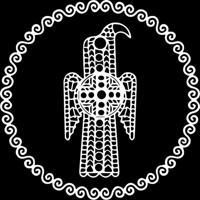
Will of Gaut
A Gothic brotherhood for unified Sons of Gaut (God). Pan-Celto-Germanic-Slav Faith that works to increase the solidarity of European and Eurasian faith that was unified by our so called "Barbarian" ancestors who were IE even after they became Christian
إظهار المزيد- المشتركون
- التغطية البريدية
- ER - نسبة المشاركة
جاري تحميل البيانات...
جاري تحميل البيانات...
'They took Ymir's skull and made from it the sky and set it over the earth, with four corners, and under each corner they set a dwarf. The names of those dwarfs are East, West, North and South. Then they took the sparks and glowing embers that were flying about in Muspell and placed them in the sky, both above and below, to illuminate heaven and earth. They gave stations to all fires, some in heaven, some wandering free under the heavens. Thus were formed the stars.'The Dutch continued to use the term 'Woonswaghen' or 'Woenswaghen' in the phrase sevenstarre ofde Woenswaghen ('the seven stars of Wōden's Wagon') as late as the 15th century. Sigrdrífumál verse 17 has Reið Rǫgnis, ('the conveyance of Rǫgnir' or 'Rǫgnir's wagon'), where Rǫgnir ('Chief', 'He that reigns') is another epithet for Óðinn. The term valdr vagnbrautar ('ruler of the wagon-road') is found for Óðinn as well, with vagnbrautar ('the road of the wagon') being the road upon which the constellations of the wagon, (the heavenly celestial bodies) travel. Another epithet for Óðinn in Old Norse is Jǫrmunr, which can be interpreted as 'great' or 'mighty' but also carries the connotation of something vast or cosmic in scope much in the same way that Jǫrmungandr encompasses the entirety of Miðgarðr, which aligns well with one of Óðinn's overarching qualities as a deity who transcends boundaries, connects worlds and possesses cosmic wisdom. Óðinn's association with the stars and celestial bodies is also seen in Skáldskaparmál when Iðunn was kidnapped and taken to Þrymheimr, located in Jǫtunheimr, by the jǫtunn Þjazi. Loki transformed into a falcon and brought Iðunn back to Ásgarðr but Þjazi's daughter, Skaði, sought vengeance after Þjazi was killed. The Gods provided compensation in the form of marriage to Njǫrðr and Óðinn took Þjazi's eyes and placed them in the night sky as stars:
'Thereupon reconciliation was made with her on the part of the Æsir. It is so said, that Óðinn did this by way of atonement to Skaði: he took Þjazi's eyes and cast them up into the heavens, and made of them two stars.'Cleasby and Vígfusson in An Icelandic-English Dictionary p. 594 and Grimm's Teutonic Mythology theorise that Þjazi's eyes represent two stars in our modern constellation Gemini, Castor and Pollux (Alpha Gemini and Beta Gemini), which appear above and to the left of Orion.
In English and Irish lore the ‘big dipper’ (to use an Americanism) was sometimes called ‘the plough’. The Norse word for plough was arþer (arther) and probably the origin of ‘Arthur’s wain’ which replaced the English ‘Woden’s Wain’ which the constellation was also known by.
Tun Gothi haut segnes reperti arma capessunt primoque conflictu mox Romanos devincunt, Fuscoque duce exstincto, divitias de castris militum spoliant, magnaque potiti per loca victoria, jam proceres suos, quorum quasi fortuna vincebant, non puros homines, sed semideos, id est Ansis, vocaverunt. Quorum genealogia ut paucis percurram, vel quis quo parente genitus est, aut unde origo coepta, ubi finem effecit absque invidia qui legis vera dicentam ausculta: Horum ergo heroum ut ipsi suis in fabulis referent, primus fuit Gaut... 'Once the Goths were aware, they took their weapons and soon overcame the Romans in the first clash, they slew Fuscus, the commander, and looted the treasure from the camp of the army; because of the great victory they had gained in this region, they thereafter called their foremost men, through whose luck they had won, not mere men, but demi-gods, that is, Ansis. Their lineage, as I shall briefly say, or who was born from which parent, and where the lineage had its beginning and ending, to this they listen attentively when it is spoken. Of these heroes the first was Gaut, as they tell in their own stories.'In medieval Norse poetry, Gautr is the most common byname for Óðinn with 18 instances, followed by Yggr at 14. Gautatýr ('God of the Geats') is an epithet referring to Óðinn as the god of the Gautar - the Old Norse word for the Goths - who were the progenitors of the Swedes, the Svíar and Gutes, Visigoths and Ostrogoths. The name Geat also appears in Anglo-Saxon royal genealogies as 'Geta' in Asser's Life of King Alfred where he lists the West Saxon noble ancestors. Additionally, the homonym Geat in its plural form 'Geatas' is the tribe to whom Beowulf belonged.
“The Norwegian kings of heathen times were descendants of divine ancestors. They recognized the will of the popular assemblies as a real limitation on their own powers, but no religious authority could claim superiority to the ruler. The king was indeed himself a priest, a mediator between the gods and men.” ~Konungs Skuggsjá
تسمح خطتك الحالية بتحليلات لما لا يزيد عن 5 قنوات. للحصول على المزيد، يُرجى اختيار خطة مختلفة.
